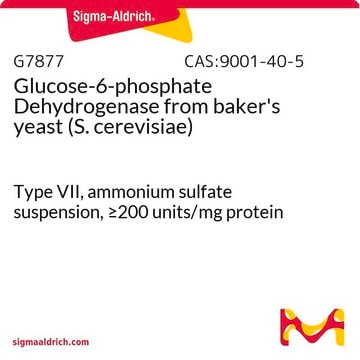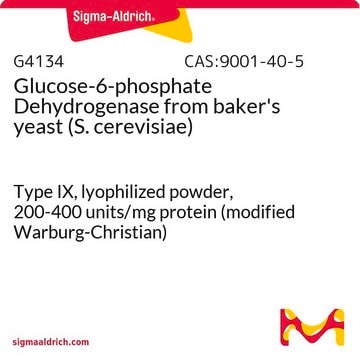10165875001
Roche
Glucose-6-Phosphate Dehydrogenase (G6P-DH)
from Leuconostoc mesenteroides
Synonyme(s) :
G6P-DH, Glucose-6-Phosephate Dehydrogenase
About This Item
Produits recommandés
Source biologique
bacterial (Leuconostoc mesenteroides)
Niveau de qualité
Forme
solution
suspension
Activité spécifique
~550 units/mg protein (At 25 °C (650 U/mg at 30 °C) with glucose-6-P and NAD as the substrates.)
Poids mol.
dimer 110 kDa
Conditionnement
pkg of 1 mL (1,000 U)
Fabricant/nom de marque
Roche
Concentration
≥0.1-1.0 % (w/w)
Technique(s)
activity assay: suitable
Couleur
white
pH optimal
7.0-8.5(maximal activity at 7.8)
Solubilité
water: miscible
Numéro d'accès NCBI
Numéro d'accès UniProt
Application(s)
life science and biopharma
Activité étrangère
6-PGDH <0.001%
CK <0.001%
GR <0.01%
HK <0.05%
NADH oxidase <0.02%
PGI <0.01%
Conditions d'expédition
wet ice
Température de stockage
2-8°C
Description générale
Spécificité
LG6P-DH does not react with fructose-6-phosphate, fructose-1,6-biphosphate, glucose-1-phosphate or ribose-1-phosphate. LG6P-DG will oxidize 2-deoxy-glucose-6-phosphate with NADP, but not with NAD as coenzyme. There is a slow reaction with D-glucose.
Heat inactivation: The ammonium sulfate suspension is not inactivated when heated to temperatures ≤ 50 °C for 10 minutes. At temperatures > 60 °C the enzyme is rapidly inactivated.
Application
Qualité
Définition de l'unité
Unit Definition: One unit (U) LG6P-DH oxidizes 1 mol of glucose-6-phosphate and reduces 1 mol of NAD in 1 minute at +25 °C and pH 7.8.
Forme physique
Notes préparatoires
Remarque sur l'analyse
Autres remarques
Code de la classe de stockage
12 - Non Combustible Liquids
Classe de danger pour l'eau (WGK)
WGK 1
Point d'éclair (°F)
does not flash
Point d'éclair (°C)
does not flash
Certificats d'analyse (COA)
Recherchez un Certificats d'analyse (COA) en saisissant le numéro de lot du produit. Les numéros de lot figurent sur l'étiquette du produit après les mots "Lot" ou "Batch".
Déjà en possession de ce produit ?
Retrouvez la documentation relative aux produits que vous avez récemment achetés dans la Bibliothèque de documents.
Les clients ont également consulté
Notre équipe de scientifiques dispose d'une expérience dans tous les secteurs de la recherche, notamment en sciences de la vie, science des matériaux, synthèse chimique, chromatographie, analyse et dans de nombreux autres domaines..
Contacter notre Service technique









